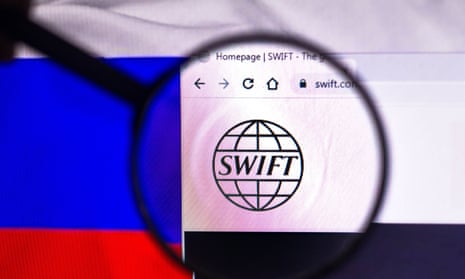Russia’s invasion of Ukraine has amplified pressure for tougher economic sanctions on Moscow. On Saturday night the US, Canada, UK, and Germany, have agreed to remove “selected Russian banks” from Swift – the world’s main international payments network – with the aim of hitting Russian trade and making it harder for its companies to do business.
What is Swift?
Swift (the Society for Worldwide Interbank Financial Telecommunication) is the main secure messaging system that banks use to make rapid and secure cross-border payments, allowing international trade to flow smoothly. It has become the principal mechanism for financing international trade. In 2020, about 38 million transactions were sent each day over the Swift platform, facilitating trillions of dollars’ worth of deals.
Who owns Swift?
Swift, founded in the 1970s, is a cooperative of thousands of member institutions that use the service. Based in Belgium, it remains neutral in trade disputes, being run principally as a service to its members.
Why is a Swift ban so serious?
Run-of-the-mill transactions would need to be conducted directly between banks, or routed through fledgling rival systems, adding to costs and creating delays.
Why were some countries initially reluctant to implement a ban?
One reason was that the impact on Russian businesses might not be so serious. The head of a large Russian bank, VTB, said recently he could use other channels for payments, such as phones, messaging apps or email. Russian banks could also route payments via countries that have not imposed sanctions, such as China, which has set up its own payments system to rival Swift. A ban on Russia using Swift could accelerate a the use of China’s rival Cips system. There is also a fear that it could damage the US dollar’s status as the global reserve currency, and accelerate the use of alternatives such as cryptocurrencies.
Will a Swift ban affect other countries?
The Biden administration was concerned that a ban could harm its allies as much as it did Russian firms. Russia is a big buyer of foreign manufactured goods, especially from the Netherlands and Germany. Russia is the main EU supplier of crude oil, natural gas and solid fossil fuels, and European countries could find it harder to find replacement suppliers. However, the EU has now also got behind the ban.
Is Swift bound by economic sanctions?
In the past, Swift has resisted calls to impose bans on certain countries, describing itself as neutral. But in 2012, the European Union barred Swift from serving Iranian firms and individuals sanctioned in relation to Tehran’s nuclear programme, setting a precedent for action against Russia. A Swift spokesperson declined to say how the organisation would respond to any US sanctions, Reuters said.
